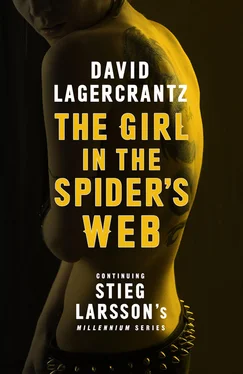“And Zalachenko never knew of this?”
“It seems not, and she understood nothing at first. It was all in Russian. There were various lists, and some numbers — accounts of the revenues from his trafficking operations. To this day I have no idea how much she worked out then and how much she found out later. She came to understand that her mother was not the only one made to suffer by her father. He was destroying other women’s lives too, and that made her wild with rage. That is what turned her into the Lisbeth we know today, the one who hates men who...”
“... hate women.”
“Precisely. But it also made her stronger. She saw that there was no turning back — she had to stop her father. She went on with her searches on other computers, including at school, where she would sneak into the staffroom, and sometimes she pretended to be sleeping over with the friends she didn’t have while in fact she stayed overnight at school and sat at the computers until morning. She started to learn everything about hacking and programming, and I imagine that it was the same as when other child prodigies discover their niche — she was in thrall. She felt that she was born for this. Many of her contacts in the digital world began to take an interest in her even then, the way the older generation has always engaged with younger talents, whether to encourage or crush them. Many people out there were irritated by her unorthodox ways, her completely new approach. But others were impressed, and she made friends, including Plague — you know about him. She got her first real friends by way of the computer and above all, for the first time in her life, she felt free. She could fly through cyberspace, just like the Wasp. There was nothing to tie her down.”
“Did Camilla realize how accomplished she’d become?”
“She certainly had her suspicions. I don’t know, I really don’t want to speculate, but sometimes I think of Camilla as Lisbeth’s dark side, her shadow figure.”
“The evil twin.”
“A bit, though I don’t like to call people evil, especially not young women. If you want to dig into it yourself I suggest you get in touch with Margareta Dahlgren, Camilla’s foster mother after the havoc at Lundagatan. Margareta lives in Stockholm now, in Solna, I think. She’s a widow and has had a desperately sad life.”
“In what way?”
“Well, that may also be of interest. Her husband Kjell, a computer programmer at Ericsson, hanged himself a short time before Camilla left them. A year later their nineteen-year-old daughter also committed suicide by jumping from a Finland ferry — at least that’s what the inquest concluded. The girl had emotional problems — she struggled with her self-esteem — but Margareta never believed that version, and she even hired a private detective. Margareta is obsessed by Camilla, and to be honest I’ve always had a bit of a problem with her, I’m embarrassed to say. Margareta got in touch with me straight after you published your Zalachenko story. As you know that’s when I had just been discharged from the rehabilitation clinic. I was mentally and physically at the end of my tether and Margareta talked endlessly. She was fixated. The sight of her number on my telephone display would exhaust me, and I went to some efforts to avoid her. But now when I think about it I understand her more. I think she would be happy to talk to you, Mikael.”
“Can you let me have her details?”
“I’ll get them for you. Just wait a moment.” When Palmgren came back moments later he said, “So you’re sure that Lisbeth and the boy are safely tucked away somewhere?”
“I’m sure,” Blomkvist said. At least I hope I am , he thought. He stood up and embraced Palmgren.
Out on Liljeholmstorget the storm tore into him again. He pulled his coat close around him and thought of Salander and her sister, and for some reason also of Andrei Zander.
He decided to call him to find out how he was getting on with his story on the art dealer. But Zander never picked up.
23. xi, Evening
Zander had called Blomkvist because he had changed his mind. Of course he wanted to go out for a beer. How could he not have taken him up on the offer? Blomkvist was his idol and the very reason he had gone in for journalism. But once he dialled the number he felt embarrassed and hung up. Maybe Blomkvist had found something better to do. Zander did not like disturbing people unnecessarily, and least of all Blomkvist.
Instead he worked on. But however hard he tried, he got nowhere. The words just would not come out right and after about an hour he decided to take a walk, and so he tidied his desk and checked once again that he had deleted every word on the encrypted link. Then he said goodbye to Emil Grandén, the only other person left in the office.
Grandén was thirty-six and had worked at both T.V.4’s “Cold Facts” and Svenska Morgon-Posten . Last year he had been awarded the Stora Journalist prize for Investigative Reporter of the Year. But Zander thought — even though he tried not to — that Grandén was conceited and overbearing, at least towards a young temp like him.
“Going out for a bit,” Zander said.
Grandén looked at him as if there was something he had forgotten to say. Then he uttered in a bored tone, “O.K.”
Zander felt miserable. It may only have been Grandén’s arrogant attitude, but it was more likely because of the article about the art dealer. Why was he finding it so difficult? Presumably because all he wanted to do was help Blomkvist with the Balder story. Everything else felt secondary. But he was also spineless, wasn’t he? Why had he not let Blomkvist take a look at what he had written?
No-one could raise the level of a story like Blomkvist could, with just a few light pen strokes or deletions. Never mind. Tomorrow he would see the story with fresh eyes and then Blomkvist could read it, however bad it might be. Zander closed the door to the office and walked out towards the lift. Further down the stairs a drama was unfolding. At first he could not make out what was going on, but there was a scrawny, hollow-eyed figure molesting a beautiful young woman. Zander froze — he had always loathed violence, ever since his parents had been killed in Sarajevo. He hated fights. But his self-respect was at stake. It was one thing to run away for your own sake, but quite another to leave a fellow human being in danger, and so he rushed down the stairs yelling, “Stop, let her go!”
At first that seemed like a fatal mistake — the hollow-eyed man pulled out a knife and muttered some threat in English. Zander’s legs nearly gave way, yet he managed to muster the last remnants of his courage and spat back, like something from a B-movie, “Hey, get lost! If you don’t, you’ll regret it.” After a few seconds of posturing, the man took off with his tail between his legs. Zander and the woman were left alone in the stairwell, and that too was like a scene from a film.
At first the woman was shaken and shy. She spoke so softly that Zander had to lean in close to hear what she was saying, and it took a while before he understood what had happened. The woman had been living in a marriage from hell, she said, and even though she was now divorced and living with a protected identity her ex-husband had managed to track her down and send some stooge to harass her.
“That’s the second time that foul man has thrown himself at me today,” she said.
“Why were you up here?”
“I tried to get away and ran in, but it didn’t help. I can’t thank you enough.”
Читать дальше












